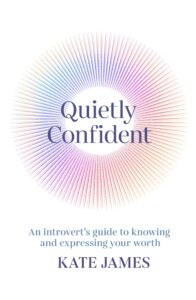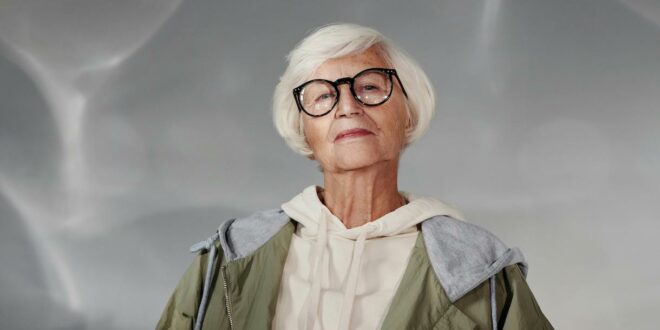 Extracted from Quietly Confident by Kate James, 9 April 2024, RRP $37.99, Pan Macmillan
Extracted from Quietly Confident by Kate James, 9 April 2024, RRP $37.99, Pan Macmillan
My definition of ‘quiet confidence’ has little in common with celebrity culture. It’s more aligned with the ancient wisdom described by different cultural groups. It doesn’t emphasise being famous or loud or always knowing the answer or being the most powerful decision-maker in a room. Instead, it places value on feeling centred, grounded and connected to your own inner ‘light’. It values connection, collaboration and contribution, and is about embodying a genuine sense of self-worth, self-respect, self-acceptance and self-compassion. For me, quiet confidence is rooted in three things:
1. Trust that deep within each of us, there’s a part of ourselves that is already confident, and with the right kind of support, we can find our way back to this time and again. Trust that we know our own values and strengths. Trust that we can choose our direction and be resilient when things don’t go to plan. Trust that we are worthy and enough, right now, just as we are. This kind of confidence doesn’t rely on external validation – it’s not about comparing, competing, achieving or striving but rather, knowing and being yourself. It’s the kind of confidence that grows as we grow. My client Deb describes it as the kind of confidence she experiences as ‘a felt sense’ in the body. She knows it when she teaches a yoga class by following her intuition but loses it entirely when she gets caught up in the negative voices in her head.
2. Connection not only with our true self, but also to the trust we have in that self. Connection to people, places and experiences that feed our true self as well as connection to something bigger than ourselves. For me, it was all of these things that gave me the courage to pursue my most closely held dreams.
3. Worth. Not in the measurable sense of wealth, beauty, titles or possessions, but in the sense of an emotional awareness that we are enough exactly as we are because every single individual has inherent value and is worthy of love and belonging. Clare’s willingness to let go of the need to be perfect is an excellent example. She came to see that her true worth was most easily expressed by engaging her innate strengths, not pretending to be something she is not.
Worth is something clinician Kent Hoffman feels strongly about. During a class at graduate school, a professor of Kent’s said something that immediately changed the way he saw other people.
He said, ‘Every person you will ever meet has infinite worth.’ In Kent’s work as a developmental researcher in psychology, he’s spent time with prisoners, cancer patients and homeless people on Skid Row. After years of working ‘in places where there is suffering’, he has come to believe that struggling with self-worth is a universally human condition.
While working with at-risk homeless teens, Kent asked them to write down a sentence or two about whatever the voice in their head was most frequently saying. In light of the tough experi- ences and difficult circumstances they were facing, the negative thoughts they shared made sense. But when he asked students in his university teaching seminars to do the same exercise, he found that they wrote virtually the same phrases, despite being ‘low- risk’ twenty-somethings in the privileged position of attending university:
• I’m not enough.
• I’m not sure I matter.
• I’m not attractive enough/smart enough/effective enough/ good enough.
• No matter how hard I try, something inside me isn’t lovable.
• Even if I make an effort, I’ll likely fail in some way.
Self-worth is something I wrestled with myself throughout my life. My family moved around a lot when I was young and starting a new school every year or so meant I had no sense of belonging to a friendship group or a place. I spent a lot of time adapting to fit in. Because my parents and sister were extroverts who thrived on meeting new people and immersing themselves in group settings, I sensed that there was something wrong with me when I felt vulnerable or needed time alone. I carried the same negative thoughts as the teenagers and students Kent Hoffman worked with.
It wasn’t until I began hearing similar stories from clients that I came to understand that I wasn’t alone. The most healing experience in my own life has been discovering that we’re all just as human as each other. Every one of us is vulnerable, we all have worries and flaws and at the same time, we also have unique gifts and strengths. It became apparent to me after working with thousands of truly wonderful clients that each of us really does have infinite worth. I could see something special in everyone who came into my room which made it easy to lean into the belief that each of us is – as Kent says – ‘an unrepeatable jewel’. Knowing and believing this is the single most important step we can take towards tapping in to true confidence.
Though Kent had grown up putting people into categories, and assigning them worth based on societal measures, after hearing those words from his professor, he understood that we all share the same miraculous infinite worth. Today, he spreads the message that no person is worth more than any other person. The idea that all of us are equally valuable is one many of us have heard, but based on my own experience and Kent’s examples, it’s a message most of us don’t believe – especially when it comes to ourselves.
Self-esteem
Self-esteem is closely linked to self-worth and also to confidence, but it’s worth pausing to unpack the differences between these terms because they inform and influence each other. Interestingly, though people with high self-esteem generally find it easier to act with more confidence, the reverse isn’t always the case. Self-confidence is not always accompanied by high self-esteem. People can be full of confidence but not necessarily ‘esteem’ themselves.
Generally speaking, confidence relates to how we feel about our own ability to do something, while self-worth relates to the belief that we are always worthy and of equal value to everyone else. Ideally, both of these things are measured internally, and, when belief in them is strong, they are unlikely to be shaken by external influences.
In contrast, self-esteem relates to how we ‘esteem’ ourselves – i.e., how we think of ourselves and estimate our worth, often in the eyes of others and generally, at a given point in time. How we gauge this can depend on how we stack up against markers of success (e.g., career status, physical appearance, material wealth, friends, academic or sporting achievements), and how we imagine other people perceive us. When we believe we are worthy and others view us positively, we experience the positive feelings of high self-esteem. When we believe we are less worthy than others, we experience the negative feelings of low self-esteem.
When defined this way, self-esteem is volatile and changeable. We might only think that we are valuable and worthy in moments when we’re behaving at our best; when our relationships are harmonious; when we’re working in certain roles; when we are achieving our goals or ‘maximising our potential’. And if we’re tired, unwell or if our mood happens to be low, this evaluation of ourselves is likely to be distorted and inaccurate.
A more helpful view of self-esteem comes closer to the concept of intrinsic worth. High self-esteem involves being generally accepting of yourself, respecting and appreciating yourself and having ‘intrinsic value and worth despite your human weaknesses’. It means feeling that you’re worthy of taking up space in the world and able to enjoy what life has to offer – even during times when you’re imperfect.
The good news is that it’s universally agreed upon that we can grow both our confidence and our self-esteem at any stage in life and while this book is ultimately about building quiet confidence, it is also designed to change the relationship you have with yourself, which will provide a genuine boost to your self-esteem and an enduring sense of self-worth.









Join the Discussion
Type out your comment here:
You must be logged in to post a comment.